2020年6月大学英语四级作文范文:说谎
- 格式:doc
- 大小:25.00 KB
- 文档页数:3
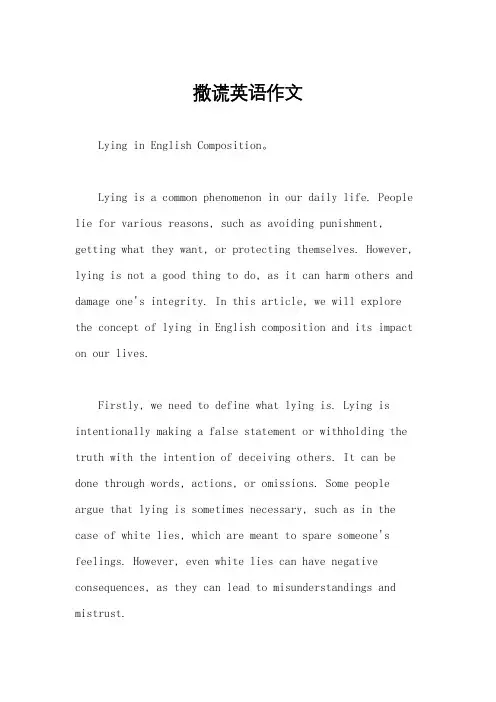
撒谎英语作文Lying in English Composition。
Lying is a common phenomenon in our daily life. People lie for various reasons, such as avoiding punishment, getting what they want, or protecting themselves. However, lying is not a good thing to do, as it can harm others and damage one's integrity. In this article, we will explore the concept of lying in English composition and its impact on our lives.Firstly, we need to define what lying is. Lying is intentionally making a false statement or withholding the truth with the intention of deceiving others. It can be done through words, actions, or omissions. Some people argue that lying is sometimes necessary, such as in the case of white lies, which are meant to spare someone's feelings. However, even white lies can have negative consequences, as they can lead to misunderstandings and mistrust.Secondly, we need to understand why people lie. There are many reasons why people lie, such as fear of punishment, desire for personal gain, or protection of self-image. For example, a student may lie to their teacher aboutcompleting their homework because they fear being punished for not doing it. A politician may lie to theirconstituents to gain their support or protect their reputation. A person may lie to their partner to avoid conflict or maintain a positive image.Thirdly, we need to examine the impact of lying on our lives. Lying can have serious consequences, both for theliar and the person being lied to. It can damage relationships, erode trust, and harm one's reputation. For example, if a person is caught lying, they may lose thetrust and respect of their friends, family, or colleagues. They may also face legal or financial consequences if their lies are discovered. Moreover, lying can have a negative impact on one's mental health, as it can lead to guilt, shame, and anxiety.In conclusion, lying is a complex and controversial issue in English composition. While some argue that lyingis sometimes necessary, it is generally agreed that lyingis not a good thing to do, as it can harm others and damage one's integrity. Therefore, we should strive to be honest and truthful in our interactions with others, even if it means facing the consequences of our actions. By doing so, we can build stronger relationships, earn the trust of others, and live a more fulfilling life.。
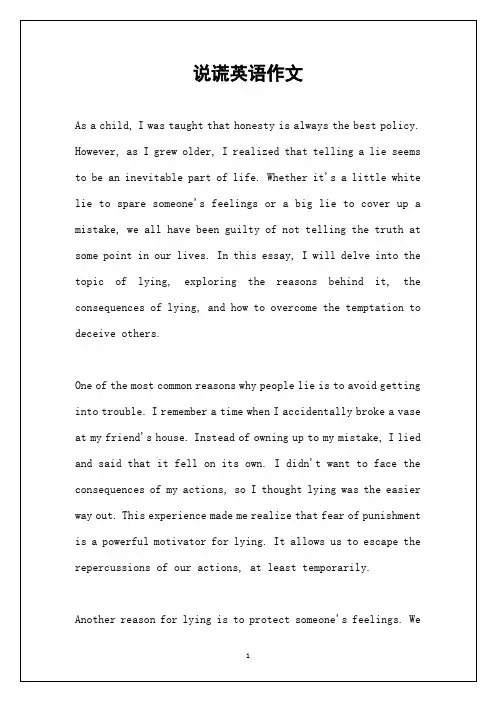
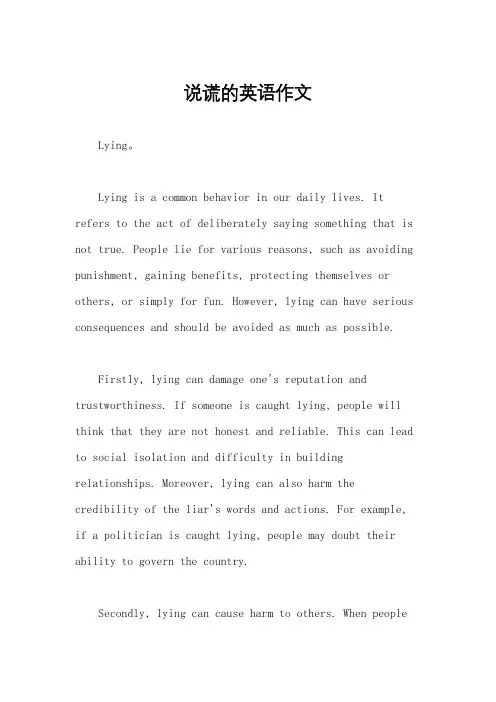
说谎的英语作文Lying。
Lying is a common behavior in our daily lives. It refers to the act of deliberately saying something that is not true. People lie for various reasons, such as avoiding punishment, gaining benefits, protecting themselves or others, or simply for fun. However, lying can have serious consequences and should be avoided as much as possible.Firstly, lying can damage one's reputation and trustworthiness. If someone is caught lying, people will think that they are not honest and reliable. This can lead to social isolation and difficulty in building relationships. Moreover, lying can also harm thecredibility of the liar's words and actions. For example, if a politician is caught lying, people may doubt their ability to govern the country.Secondly, lying can cause harm to others. When peoplelie, they often deceive others and mislead them into making wrong decisions or taking harmful actions. For instance, if a doctor lies about a patient's condition, the patient may not receive the proper treatment and suffer from more serious illnesses. Similarly, if a salesperson lies about the quality of a product, the customer may waste their money and be disappointed.Thirdly, lying can have psychological effects on the liar. When people lie, they may feel guilty, anxious, or ashamed. This can lead to stress, depression, and other mental health problems. Moreover, lying can also damageone's self-esteem and confidence. If someone lies frequently, they may start to doubt their own abilities and worthiness.To avoid lying, one should cultivate honesty and integrity. This means telling the truth even when it's difficult or inconvenient. It also means taking responsibility for one's actions and being accountable for the consequences. Additionally, one should strive to build trust and credibility with others by being consistent,reliable, and transparent.In conclusion, lying is a harmful behavior that can have serious consequences. It can damage one's reputation, harm others, and have psychological effects. Therefore,it's important to avoid lying as much as possible and cultivate honesty and integrity in our daily lives.。
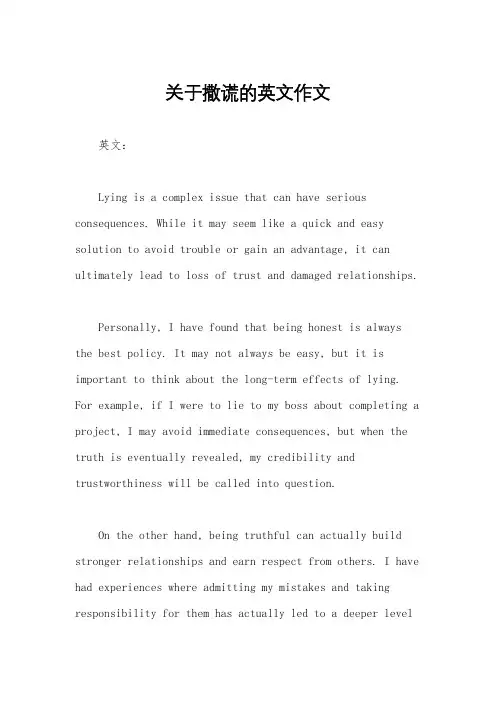
关于撒谎的英文作文英文:Lying is a complex issue that can have serious consequences. While it may seem like a quick and easy solution to avoid trouble or gain an advantage, it can ultimately lead to loss of trust and damaged relationships.Personally, I have found that being honest is always the best policy. It may not always be easy, but it is important to think about the long-term effects of lying. For example, if I were to lie to my boss about completing a project, I may avoid immediate consequences, but when the truth is eventually revealed, my credibility and trustworthiness will be called into question.On the other hand, being truthful can actually build stronger relationships and earn respect from others. I have had experiences where admitting my mistakes and taking responsibility for them has actually led to a deeper levelof trust and understanding with friends and colleagues.Of course, there are situations where telling the truth may not be appropriate or safe. In these cases, it is important to carefully consider the consequences of both lying and telling the truth. It may be necessary to seek advice from a trusted friend or professional before makinga decision.In summary, while lying may seem like an easy way out,it is important to consider the long-term effects and potential consequences. Being honest may not always be easy, but it can lead to stronger relationships and a better reputation in the long run.中文:撒谎是一个复杂的问题,可能会带来严重的后果。
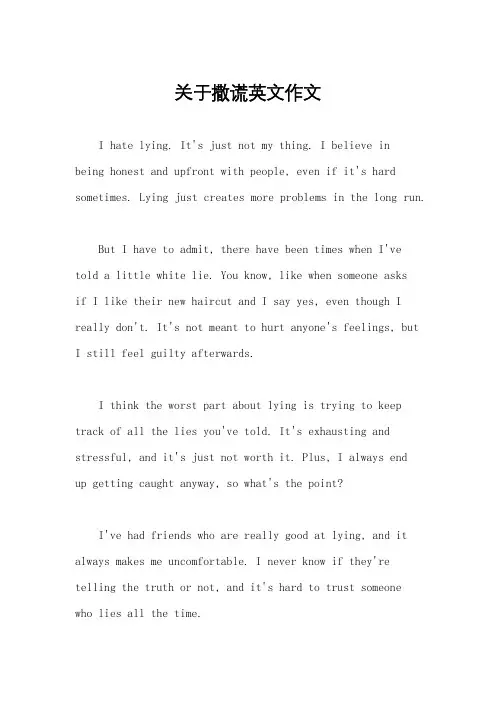
关于撒谎英文作文I hate lying. It's just not my thing. I believe inbeing honest and upfront with people, even if it's hard sometimes. Lying just creates more problems in the long run.But I have to admit, there have been times when I'vetold a little white lie. You know, like when someone asksif I like their new haircut and I say yes, even though I really don't. It's not meant to hurt anyone's feelings, but I still feel guilty afterwards.I think the worst part about lying is trying to keep track of all the lies you've told. It's exhausting and stressful, and it's just not worth it. Plus, I always endup getting caught anyway, so what's the point?I've had friends who are really good at lying, and it always makes me uncomfortable. I never know if they'retelling the truth or not, and it's hard to trust someonewho lies all the time.I know some people lie to protect themselves or others, but I still don't think it's right. I'd rather deal with the consequences of telling the truth than live with the guilt of lying.In the end, I think honesty is the best policy. It might be tough sometimes, but it's always the right thing to do.。
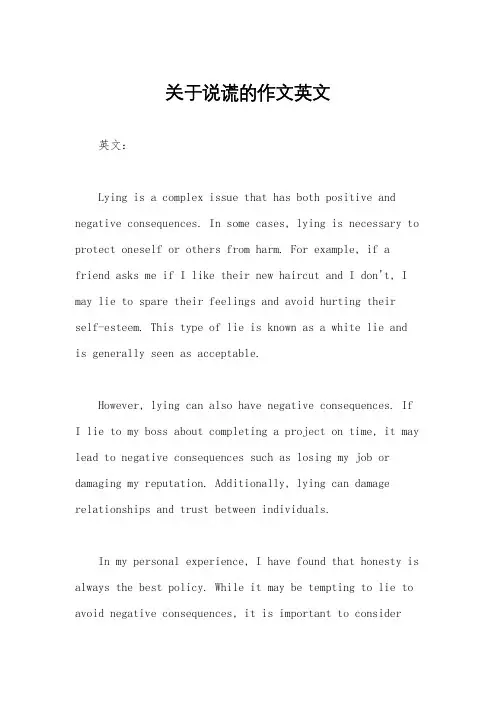
关于说谎的作文英文英文:Lying is a complex issue that has both positive and negative consequences. In some cases, lying is necessary to protect oneself or others from harm. For example, if a friend asks me if I like their new haircut and I don't, I may lie to spare their feelings and avoid hurting theirself-esteem. This type of lie is known as a white lie and is generally seen as acceptable.However, lying can also have negative consequences. If I lie to my boss about completing a project on time, it may lead to negative consequences such as losing my job or damaging my reputation. Additionally, lying can damage relationships and trust between individuals.In my personal experience, I have found that honesty is always the best policy. While it may be tempting to lie to avoid negative consequences, it is important to considerthe long-term effects of lying. When I am honest with others, it builds trust and strengthens relationships. If I make a mistake or fall short, I am upfront about it andtake responsibility for my actions.中文:说谎是一个复杂的问题,有积极和消极的后果。
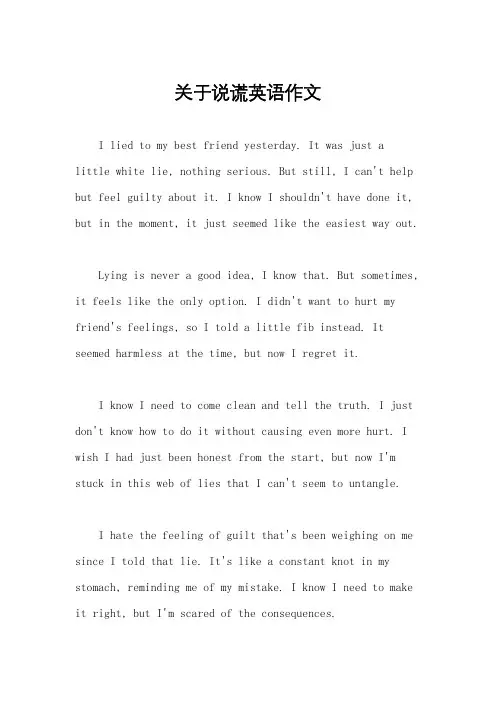
关于说谎英语作文I lied to my best friend yesterday. It was just alittle white lie, nothing serious. But still, I can't help but feel guilty about it. I know I shouldn't have done it, but in the moment, it just seemed like the easiest way out.Lying is never a good idea, I know that. But sometimes, it feels like the only option. I didn't want to hurt my friend's feelings, so I told a little fib instead. It seemed harmless at the time, but now I regret it.I know I need to come clean and tell the truth. I just don't know how to do it without causing even more hurt. I wish I had just been honest from the start, but now I'm stuck in this web of lies that I can't seem to untangle.I hate the feeling of guilt that's been weighing on me since I told that lie. It's like a constant knot in my stomach, reminding me of my mistake. I know I need to make it right, but I'm scared of the consequences.Lying may seem like the easy way out, but in the end,it only causes more harm than good. I've learned my lesson, and I promise to never lie to my friend again. It's time to face the truth and make things right.。
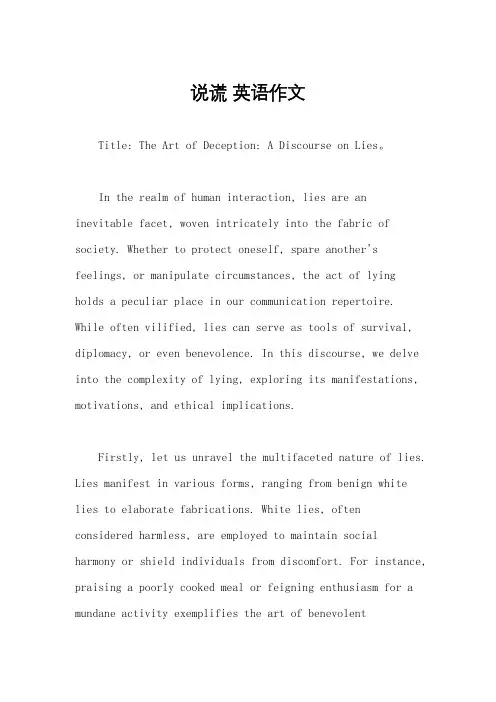
说谎英语作文Title: The Art of Deception: A Discourse on Lies。
In the realm of human interaction, lies are aninevitable facet, woven intricately into the fabric of society. Whether to protect oneself, spare another's feelings, or manipulate circumstances, the act of lying holds a peculiar place in our communication repertoire. While often vilified, lies can serve as tools of survival, diplomacy, or even benevolence. In this discourse, we delve into the complexity of lying, exploring its manifestations, motivations, and ethical implications.Firstly, let us unravel the multifaceted nature of lies. Lies manifest in various forms, ranging from benign white lies to elaborate fabrications. White lies, oftenconsidered harmless, are employed to maintain social harmony or shield individuals from discomfort. For instance, praising a poorly cooked meal or feigning enthusiasm for a mundane activity exemplifies the art of benevolentdeception. Conversely, lies can assume more sinister guises, such as manipulation, fraud, or deceitful propaganda. In politics, business, and personal relationships alike, falsehoods wield the power to sway opinions, exploit vulnerabilities, and obscure truths.The motivations underlying lies are equally diverse, reflecting the intricacies of human psychology and social dynamics. Fear, arguably one of the primal motivators, compels individuals to conceal their vulnerabilities, insecurities, or transgressions. Shame, embarrassment, or the desire to evade consequences drive individuals todistort reality, constructing elaborate facades tosafeguard their reputation or preserve their self-image. Moreover, lies often serve as instruments of control or influence, wielded by those in positions of power to manipulate narratives, subvert dissent, or consolidate authority.Ethical considerations permeate the terrain of lying, prompting introspection into the morality of deceit. While absolute honesty is extolled as a virtue, the morallandscape surrounding lies is nuanced and context-dependent. The age-old moral quandary of whether the end justifies the means underscores the ethical ambiguity of lying. In situations where lives hang in the balance or greater goods are at stake, the ethical calculus of lying becomes convoluted, blurring the boundaries between deception and altruism. Furthermore, cultural norms, societal expectations, and personal values influence individual perceptions of lying, engendering a diverse spectrum of moral attitudes towards deceit.Amidst the moral conundrum lies the question of trust—the fragile currency of human relationships. Lying erodes trust, corroding the foundation of interpersonal bonds and fostering cynicism. Yet, paradoxically, lies can also be construed as acts of trust, entrusting the recipient with sensitive information or confidences. The delicateinterplay between trust and deception underscores the intricate dynamics of human interaction, wherein lies serve as both bridges and barriers to intimacy.In conclusion, the art of lying is a complex tapestrywoven from strands of necessity, morality, and interpersonal dynamics. While lies may be ubiquitous, their ethical ramifications necessitate careful consideration. In navigating the labyrinth of deceit, one must tread cautiously, mindful of the delicate balance between truth and falsehood. Ultimately, whether lies are wielded as weapons of manipulation or shields of protection, their potency lies in their ability to shape perceptions, influence outcomes, and navigate the intricate dance of human relationships.。
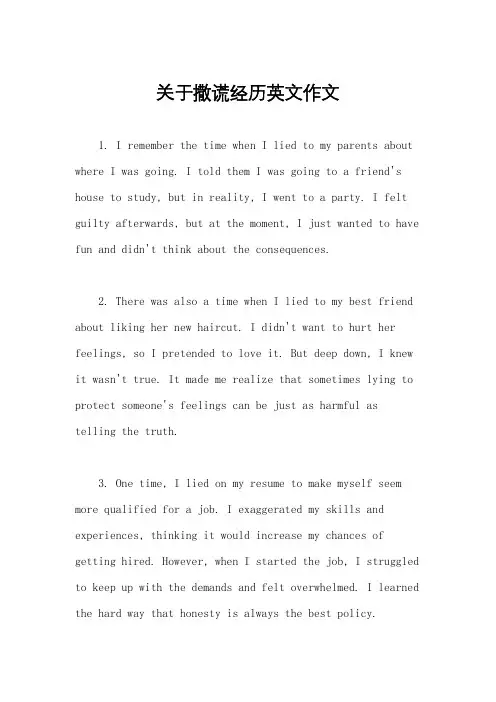
关于撒谎经历英文作文1. I remember the time when I lied to my parents about where I was going. I told them I was going to a friend's house to study, but in reality, I went to a party. I felt guilty afterwards, but at the moment, I just wanted to have fun and didn't think about the consequences.2. There was also a time when I lied to my best friend about liking her new haircut. I didn't want to hurt her feelings, so I pretended to love it. But deep down, I knew it wasn't true. It made me realize that sometimes lying to protect someone's feelings can be just as harmful astelling the truth.3. One time, I lied on my resume to make myself seem more qualified for a job. I exaggerated my skills and experiences, thinking it would increase my chances of getting hired. However, when I started the job, I struggled to keep up with the demands and felt overwhelmed. I learned the hard way that honesty is always the best policy.4. I once lied to a friend about why I couldn't hang out with them. I made up an excuse about being sick when in reality, I just wanted to stay home and relax. It taught me that sometimes it's okay to prioritize self-care and set boundaries, but lying is never the right way to do it.5. Another time, I lied to myself about my feelings for someone. I convinced myself that I was in love when deep down, I knew it wasn't true. It took me a while to admit the truth to myself and others, but once I did, I felt a sense of relief and freedom.6. Lastly, I remember a time when I caught a friend lying to me. It hurt to realize that someone I trusted was dishonest with me. It made me reflect on my own actions and strive to be more truthful in all aspects of my life.。
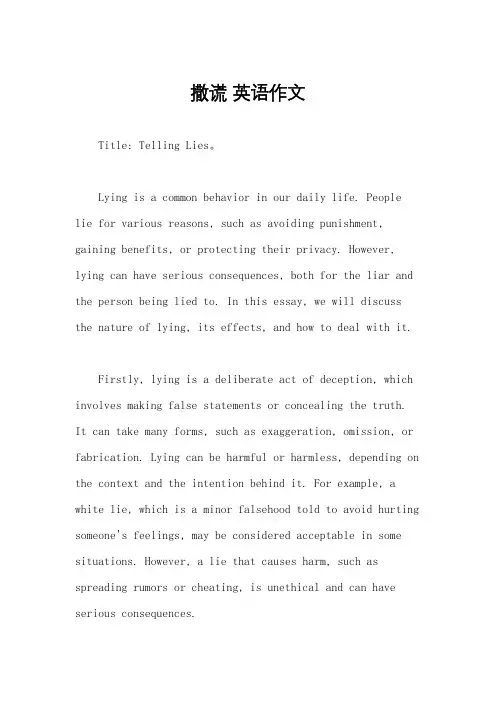
撒谎英语作文Title: Telling Lies。
Lying is a common behavior in our daily life. Peoplelie for various reasons, such as avoiding punishment, gaining benefits, or protecting their privacy. However, lying can have serious consequences, both for the liar and the person being lied to. In this essay, we will discuss the nature of lying, its effects, and how to deal with it.Firstly, lying is a deliberate act of deception, which involves making false statements or concealing the truth. It can take many forms, such as exaggeration, omission, or fabrication. Lying can be harmful or harmless, depending on the context and the intention behind it. For example, a white lie, which is a minor falsehood told to avoid hurting someone's feelings, may be considered acceptable in some situations. However, a lie that causes harm, such as spreading rumors or cheating, is unethical and can have serious consequences.Secondly, lying can have negative effects on both the liar and the person being lied to. For the liar, lying can lead to feelings of guilt, shame, and anxiety. It can also damage their reputation and credibility, which can have long-term effects on their personal and professional relationships. For the person being lied to, lying can cause distrust, hurt, and disappointment. It can also lead to misunderstandings and conflicts, which can damage their relationship with the liar.Thirdly, dealing with lying can be challenging, but there are ways to address it. If you suspect someone is lying to you, it is important to confront them in a calm and respectful manner. Ask them to explain their behavior and listen to their response. If they admit to lying, try to understand their reasons and work together to find a solution. If they deny lying, provide evidence to support your claim and encourage them to be honest. It is also important to set clear boundaries and expectations in your relationships to prevent lying from happening in the first place.In conclusion, lying is a complex and multifaceted behavior that can have serious consequences. It is important to recognize the nature of lying, its effects, and how to deal with it. By promoting honesty and integrity in our relationships, we can build trust, respect, and understanding with others.。
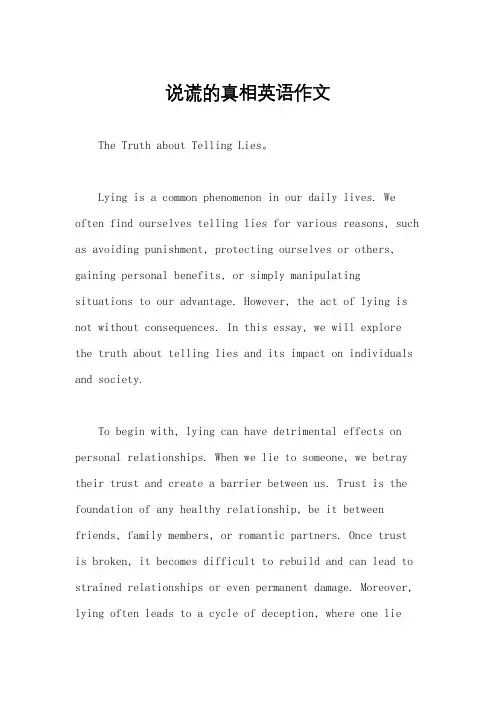
说谎的真相英语作文The Truth about Telling Lies。
Lying is a common phenomenon in our daily lives. We often find ourselves telling lies for various reasons, such as avoiding punishment, protecting ourselves or others, gaining personal benefits, or simply manipulatingsituations to our advantage. However, the act of lying is not without consequences. In this essay, we will explore the truth about telling lies and its impact on individuals and society.To begin with, lying can have detrimental effects on personal relationships. When we lie to someone, we betray their trust and create a barrier between us. Trust is the foundation of any healthy relationship, be it between friends, family members, or romantic partners. Once trust is broken, it becomes difficult to rebuild and can lead to strained relationships or even permanent damage. Moreover, lying often leads to a cycle of deception, where one lierequires another to cover it up, creating a web of deceit that becomes increasingly difficult to maintain.Furthermore, lying can have severe consequences onone's mental and emotional well-being. Constantly living in fear of being caught in a lie can cause immense stress and anxiety. The guilt and shame associated with lying can lead to feelings of self-doubt and low self-esteem. Additionally, lying can erode one's sense of integrity and authenticity, as it requires individuals to present a false version of themselves to the world. This internal conflict between the truth and the lies can have long-lasting negative effectson one's mental health.In addition to its impact on individuals, lying alsohas broader societal implications. In a society where lying is prevalent, trust and honesty become undervalued virtues. This can lead to a breakdown of social cohesion and a lackof faith in institutions and authority figures. When lying becomes the norm, it becomes increasingly difficult to discern the truth from falsehoods, leading to a societybuilt on deception and manipulation. Moreover, lying canhave legal consequences, as perjury and false testimony are considered criminal offenses in many jurisdictions.While the negative effects of lying are evident, it is important to acknowledge that there may be situations where lying is deemed necessary or even morally justifiable. For instance, in cases where telling the truth could endanger someone's life or cause irreversible harm, lying might be seen as the lesser of two evils. However, such situations should be rare exceptions rather than the norm, as habitual lying can lead to a multitude of problems.In conclusion, the truth about telling lies is that itis a destructive force that can harm personal relationships, erode one's mental and emotional well-being, and have detrimental effects on society as a whole. While there may be rare instances where lying is justified, it is crucialto recognize the long-term consequences and strive for honesty and integrity in our daily lives. Only by valuing truth can we build a society based on trust, respect, and genuine human connections.。
2020年大学英语四级作文预测20篇:说谎Directions: Write a composition entitled Telling Lies. You should write at least 120 words according to the outline given below in Chinese:1. 人们对说谎通常的看法;2. 是否说谎都是有害的?说明你的看法。
3. 总结全文。
【经典范文】Telling LiesTelling lies is usually looked upon as an evil, because some people try to get benefit from dishonest means or try to conceal their faults.However,_I_thinkdespitejits_neg1ative_effects,jsometimes_itji sjessentialto iemigsinour_dailylifei First, the liar may benefit from the lie by escaping from the pressure of unnecessary embarrassment. Meanwhile, the listener may also feel more comfortable by reasonable excuses. For example, if a little girl’s father died in an accident, her mother would comfort her by saying “farther has gone to another beautiful land”. In such cases, a lie with original goodwill can make the cruel nice. Second^thejsk^lsjofJtellingJlies^jtojsome extent,canbe_regard_asja_capacity_ofcreationandjimagination.Therefore,jtakingjallJthese_factor^jntojconsideration,_wecand efinitely come to the conclusion that whether telling a lieis harmful depends on its original intention and the ultimate result it brings. (159 words)。
撒谎行为英文作文I once lied to my parents about where I was going after school. I told them I was going to the library to study, but I actually went to the mall with my friends.There was a time when I lied to my best friend about liking her new haircut. I said it looked great, but I actually thought it didn't suit her at all.I remember lying to my boss about being sick so I could take a day off work and go to a music festival.Once, I lied to my teacher about not having enough time to complete an assignment, when in reality I just didn't feel like doing it.I also lied to my significant other about forgetting our anniversary, when I actually remembered but didn't want to celebrate it.There was this one time when I lied to a stranger about being in a hurry so I could avoid having a conversation with them.I once lied to my sibling about eating the last piece of cake, even though I was the one who finished it.I remember lying to my doctor about how often I exercise, because I didn't want to admit that I hardly ever work out.。
说谎话好英文作文英文:Lying is never a good thing, but sometimes we may find ourselves in situations where we feel like we have no other choice. However, telling a lie can have serious consequences and can damage relationships. Here are some reasons why lying is not a good idea.Firstly, lying can break trust. When we lie to someone, we are essentially telling them that we cannot be trusted. This can damage the relationship and make it difficult to build trust again in the future.Secondly, lying can be stressful. When we tell a lie, we have to remember what we said and make sure we don't contradict ourselves. This can be exhausting and can cause anxiety.Lastly, lying can have serious consequences. If we arecaught in a lie, we may face consequences such as losing a job or damaging our reputation.In conclusion, lying is not a good idea. It can break trust, cause stress, and have serious consequences. It is always better to be honest, even if it may be difficult at times.中文:说谎话从来都不是一件好事,但有时我们可能会发现自己没有其他选择。
关于说谎的英语作文Lying is a complex and multifaceted behavior that has been a subject of debate and discussion throughout human history. In this essay, we will explore the various aspects of lying, its consequences, and the moral implications associated with it.Firstly, it is important to define what constitutes a lie. A lie is a false statement made with the intention to deceive. This can range from small white lies told to spare someone's feelings to outright fabrications that can cause significant harm. The reasons for lying are as diverse as the individuals who tell them. Some people lie to protect themselves or others, while others do it for personal gain.The impact of lying can be far-reaching. On a personal level, lying can damage trust and relationships. When someone is caught in a lie, it can lead to feelings of betrayal and mistrust, which are difficult to repair. On a societal level, widespread lying can erode social cohesion and lead to a general sense of distrust among people.However, there are instances where lying is considered acceptable or even necessary. For example, telling a whitelie to avoid hurting someone's feelings is often seen as a kind gesture. In some cultures, it is customary to avoid direct confrontations and instead use tactful language to maintain harmony.The moral implications of lying are also worth considering. Many philosophical and religious traditions teach that honesty is a virtue and lying is morally wrong. However, others argue that the morality of lying depends on the context and the intention behind it. For instance, lying to protect someone from harm may be seen as a morallyjustifiable act.In conclusion, lying is a behavior that can have both negative and positive consequences, depending on the situation. While it is generally discouraged due to its potential to damage trust and relationships, there are circumstances where lying may be the lesser of two evils. Understanding the nuances of lying and its implications requires a careful examination of the context, intention, and potential outcomes.。
关于说谎的英语作文Lying is a common behavior in our daily life. Sometimes, people lie to avoid trouble, to protect themselves, or to gain benefits. However, lying is not a good habit and it may lead to serious consequences. In this essay, I will discuss the reasons why people lie, the negative effects of lying, and how to avoid lying.There are various reasons why people lie. Firstly, people may lie to avoid trouble or punishment. For example, a student may lie about not completing their homework in order to avoid getting in trouble with their teacher. Secondly, people may lie to protect themselves or others. For instance, a person may lie about their whereabouts to protect a friend's secret. Lastly, people may lie to gain benefits or to manipulate others. For example, a salesperson may lie about the quality of a product in order to make a sale.However, lying can have serious negative effects. Firstly, lying can damage trust and relationships. When someone finds out that they have been lied to, they may feel betrayed and lose trust in the person who lied to them. This can lead to the breakdown of relationships. Secondly, lying can lead to guilt and stress. When a person lies, they may feel guilty about their actions and may experience stress from trying to keep up with the lie. Lastly, lying can have legal consequences. For example, if a person lies under oath in a court of law, they may face perjury charges.In order to avoid lying, it is important to practice honesty and integrity. Firstly, it is important to take responsibility for one's actions. Instead of lying to avoid trouble, it is important to admit to mistakes and face the consequences. Secondly, it is important to communicate openly and honestly with others. By being honest in our interactions with others, we can build trust and strengthen relationships. Lastly, it is important to consider the long-term consequences of lying. While lying may provide short-term benefits, it can have serious long-term consequences.In conclusion, lying is a common behavior, but it is not a good habit. It can have serious negative effects on relationships, mental health, and even legal consequences. In order to avoid lying, it is important to practice honesty and integrity in our daily lives. Bydoing so, we can build trust, strengthen relationships, and avoid the negative consequences of lying.。
2020年6月大学英语四级作文范文:说谎
英语作文啦精心整理了”2020年6月大学英语四级作文范文”,望给大家带来帮助!更多2020英语四六级作文,英语四六级作文题目,英语四六级作文范文,2020年6月英语四六级作文,英语四六级作文万能模板,英语四六级作文预测等,请关注英语作文啦( )四六级作文栏目!
考试吧精心整理了”2019年6月大学英语四级作文范文:实现理想”,望给大家带来帮助!更多2019英语四六级作文,英语四六级作文题目,英语四六级作文范文,2019年6月英语四六级作文,英语四六级作文万能模板,英语四六级作文预测等,请关注英语四六级作文栏目!
题目要求:
Directions: Write a composition entitled Telling Lies. You should write at least 120 words according to the outline given below in Chinese:
1. 人们对说谎通常的看法;
2. 是否说谎都是有害的?说明你的看法。
3. 总结全文。
参考范文:
Sample:
Telling Lies
Telling lies is usually looked upon as an evil, because some people try to get benefit from dishonest means or try to conceal their faults.
However,_I_thinkdespitejits_neg1ative_effects,jsometimes_itjisjesse ntialto iemigsinour_dailylifei First, the liar may benefit from the lie by escaping from the pressure of unnecessary embarrassment. Meanwhile, the listener may also feel more comfortable by reasonable excuses. For example, if a little girl’s father died in an accident, her mother would comfort her by saying “farther has gone to another beautiful land”. In such cases, a lie with original goodwill can make the cruel nice. Second hejsk sjofJtellingJlies…tojsome extent,canbe_regard_asja_capacity_ofcreationandjimagination.
Therefore,jtakingjallJthese_factor…ntojconsideration,_wecandefinitely come to the conclusion that whether telling a lie is harmful depends on its original intention and the ultimate result it brings. (159 words)
【词汇表达亮点】
look upon as把看作是
evil adj.坏的,使人不舒服的
conceal v.隐藏
fault n.缺陷,过失
essential adj.必不可少的,本质的benefit from...从中受益embarrassment n.难堪,尴尬goodwill n.善意,友善
cruel adj.残酷?的,使人痛苦的
to some extent在某种程度上take…into consi deration 考虑到,顾及come to the conclusion 得出结论harmful adj.有害的
original intention 原意
ultimate adj.最终的,根本的。